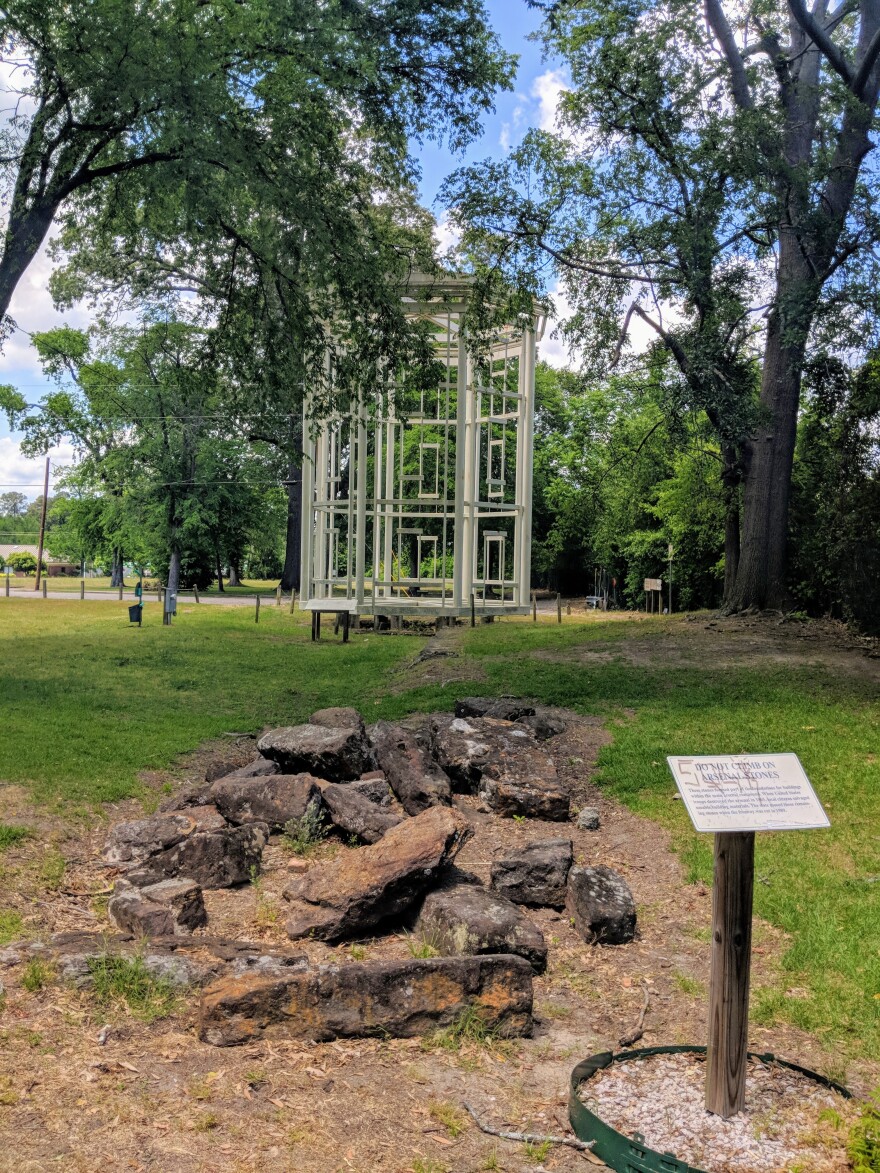Organizers in Fayetteville want to transform a regional museum into a statewide history center focusing on the Civil War and Reconstruction. But critics worry even if it’s built with the best of intentions, it could divide the community along racial lines.
On a quiet side street about a mile west of Fayetteville’s downtown, a pile of mossy rubble lies scattered amid a grove of mature trees. It’s all that’s left of a Civil War era arsenal destroyed by Union forces in 1865.

“The arsenal was one of the main reasons that General Sherman took the route that he did through North Carolina,” said David Winslow, senior consultant for the North Carolina Civil War and Reconstruction History Center Foundation. “He spent three days here in Fayetteville with a thousand army corps of engineer, levelling this arsenal. And if you walk out on the grounds here, you can still see the remains of Sherman’s work.”
What you can’t see on the site is the history center itself. Right now it’s purely conceptual. Organizers are hoping a $46-million-dollar funding bill makes its way into the state budget this year to launch the construction phase.
Once completed, the history center will be a 65,000 square-foot state-owned facility documenting all aspects of life in North Carolina from 1835 to the turn of the century.
“[We're] going to be looking at, not the battles, and the wars and the flags and the weaponry, nor the monuments, but we’re going to be looking at what it was like for the people who lived here through that period,” said foundation vice president Mary Lynn Bryan.
Advocates say the center will offer a comprehensive history grounded in academic research that includes the stories of enslaved and freed black people, as well as Native Americans.

Though the concept has been revamped to include a focus on the Reconstruction era as well as the Civil War years, some in Fayetteville worry that’s not enough to dissuade those who would lionize the Confederacy.
“There are a lot of people I’ve spoken with in the community that are concerned with the museum itself, said Mayor Mitch Colvin. “We’re trying to bridge the divide here in Fayetteville, we don’t want a Charlottesville, Virginia.”
Since the violent clash in Charlottesville in 2017 that killed one and injured dozens more, public symbols of the Confederacy have served as rallying points for neo-confederates and white supremacists, and the site of confrontations with counter-protesters.
“If we have a bunch of rallies here with the sheets and the Confederate flag, that’s going to divide this city. That’s going to divide the state,” said Fayetteville NAACP President Jimmy Buxton.
He worries the proposed history center will be a draw for white supremacists regardless of what the founders intend.
“Even if those who are in charge of this say it’s not, this is what racists are thinking – a Civil War museum,” said Buxton. "When they get here they may be fooled, but they’re coming anyway because they feel like what they’ve been worshipping all their lives is going to be in this museum."
But foundation president Mac Healy argues ignoring the history of one of the most divisive eras in the United States won’t help counter mythologies and misinformation.
"Since we started this project, our goal has been to educate, not advocate,” he said. “If we’re going to stop the hate and stop the mistrust, we’ve got to educate people what really happened.”
Part of the mission of the history center includes creating Civil War and Reconstruction curricula for public schools all across the state. Education is the key to the center’s success, supporters say, and the best way to change the minds of those who venerate the Lost Cause.
Dr. Jerry Woods is a retired professor of sociology from Fayetteville State who specializes in the study of racial inequality. He believes the center will offer a clear eyed assessment of the role race played in the Civil War.
“We can come to understand that the Civil War was fought over the issue of slavery,” said Woods. “If we can deal with that issue, successfully, we could resolve a lot of the issues and problems this country has. And this center, I think, will face that head on.”
Mayor Colvin and others aren’t convinced, and say they’d rather see state money spent on other community concerns. The history center funding plan made it into the House budget adopted in early May. Now both sides will have to wait and see what shakes out during budget negotiations with the Senate later this spring.








